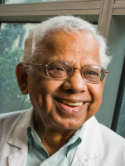Role of promoter hypermethylation in cisplatin treatment response of male germ cell tumors Journal Article
| Authors: | Koul, S.; McKiernan, J. M.; Narayan, G.; Houldsworth, J.; Bacik, J.; Dobrzynski, D. L.; Assaad, A. M.; Mansukhani, M.; Reuter, V. E.; Bosl, G. J.; Chaganti, R. S. K.; Murty, V. V. V. S. |
| Article Title: | Role of promoter hypermethylation in cisplatin treatment response of male germ cell tumors |
| Abstract: | Background: Male germ cell tumor (GCT) is a highly curable malignancy, which exhibits exquisite sensitivity to cisplatin treatment. The genetic pathway(s) that determine the chemotherapy sensitivity in GCT remain largely unknown. Results: We studied epigenetic changes in relation to cisplatin response by examining promoter hypermethylation in a cohort of resistant and sensitive GCTs. Here, we show that promoter hypermethylation of RASSF1A and HIC1 genes is associated with resistance. The promoter hypermethylation and/or the down-regulated expression of MGMT is seen in the majority of tumors. We hypothesize that these epigenetic alterations affecting MGMT play a major role in the exquisite sensitivity to cisplatin, characteristic of GCTs. We also demonstrate that cisplatin treatment induce de novo promoter hypermethylation in vivo. In addition, we show that the acquired cisplatin resistance in vitro alters the expression of specific genes and the highly resistant cells fail to reactivate gene expression after treatment to demethylating and histone deacetylase inhibiting agents. Conclusions: Our findings suggest that promoter hypermethylation of RASSF1A and HIC1 genes play a role in resistance of GCT, while the transcriptional inactivation of MGMT by epigenetic alterations confer exquisite sensitivity to cisplatin. These results also implicate defects in epigenetic pathways that regulate gene transcription in cisplatin resistant GCT. © 2004 Koul et al, licensee BioMed Central Ltd. |
| Keywords: | clinical article; controlled study; human tissue; retrospective studies; promoter region; genetics; histone deacetylase inhibitor; clinical trial; cisplatin; antineoplastic agent; metabolism; cohort studies; gene expression; antineoplastic combined chemotherapy protocols; down-regulation; cohort analysis; transcription factor; genetic transcription; in vivo study; in vitro study; drug effect; drug resistance; drug resistance, neoplasm; cell line, tumor; brca1 protein; retrospective study; dna methylation; physiology; transcription factors; rna binding protein; gene expression regulation; rna-binding proteins; tumor suppressor gene; gene expression regulation, neoplastic; methyltransferase; drug antagonism; methyltransferases; dna; epigenetics; histone; promoter regions, genetic; multicenter study; tumor suppressor proteins; tumor cell line; dna, neoplasm; testis tumor; testicular neoplasms; kruppel like factor; kruppel-like transcription factors; gene control; 5 aza 2' deoxycytidine; down regulation; gene inactivation; methylated dna protein cysteine methyltransferase; tumor suppressor protein; germ cell tumor; drug sensitivity; histones; trichostatin a; acetylation; gene expression regulation, enzymologic; demethylation; ras association domain family protein 1a; germinoma; o(6)-methylguanine-dna methyltransferase; fanconi anemia group f protein; humans; human; male; article; fragile histidine triad protein; fancf protein, human; hic1 protein, mouse; rassf1 protein, human; fanconi anemia complementation group f protein |
| Journal Title: | Molecular Cancer |
| Volume: | 3 |
| ISSN: | 1476-4598 |
| Publisher: | Biomed Central Ltd |
| Date Published: | 2004-05-18 |
| Start Page: | 16 |
| Language: | English |
| DOI: | 10.1186/1476-4598-3-16 |
| PROVIDER: | scopus |
| PMCID: | PMC420487 |
| PUBMED: | 15149548 |
| DOI/URL: | |
| Notes: | Mol. Cancer -- Cited By (since 1996):70 -- Export Date: 16 June 2014 -- CODEN: MCOAC -- Source: Scopus |
Altmetric
Citation Impact
BMJ Impact Analytics
MSK Authors
Related MSK Work







